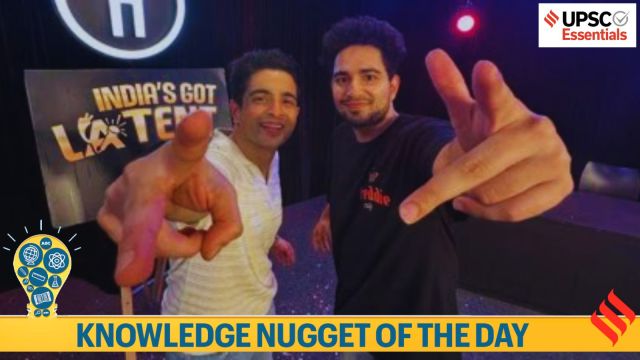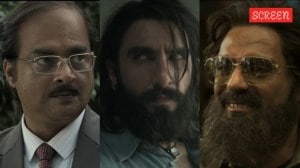The Supreme Court on Tuesday granted interim protection from arrest to podcaster Ranveer Allahbadia in FIRs related to his remarks on YouTube show India’s Got Latent. The court slammed Allahbadia on his comments, saying “there is something dirty in this person’s mind that has been spread through this program…The words you have chosen, parents will be ashamed, sisters will be ashamed. Entire society will feel ashamed.”
During an episode of India’s Got Latent, hosted by comedian Samay Raina, Allahbadia made a crude joke that caught attention for being offensive. The remark quickly triggered outrage, leading to FIRs being filed in two states — Maharashtra and Assam. While the show was intended for a limited audience, clips went viral, intensifying the backlash. As criticism mounted, Allahbadia issued a public apology, admitting that he overstepped. In response to the controversy, Samay Raina removed all videos of the show to curb further scrutiny.
1. The controversy erupted after Allahbadia, along with comedian Samay Raina and other guests, was accused of making inappropriate comments on the show, which were widely condemned for their obscene nature. The Maharashtra cyber police, along with the Assam police, have booked Allahbadia, Raina, and others involved, citing violations under obscenity laws.
2. The National Commission for Women (NCW) has also stepped in, issuing summons to Allahbadia, Raina, and five other individuals involved in the incident. This ongoing legal scrutiny follows intense public backlash after the comments made on the show sparked outrage, leading to a series of legal and official actions against the accused.
 A clip of Allahbadia’s joke immediately caused a stir on social media, with several prominent figures slamming the podcaster (Image source: @ranveerallahbadia/Instagram)
A clip of Allahbadia’s joke immediately caused a stir on social media, with several prominent figures slamming the podcaster (Image source: @ranveerallahbadia/Instagram)
Laws Governing Obscenity in Online Content
The Oxford dictionary defines obscene as ‘offensive or disgusting by accepted standards of morality and decency’.
Bharatiya Nyaya Sanhita, 2023 (BNS)
1. Section 294 of the BNS punishes those who sell, import, export, advertise, or profit from obscene material such as books, paintings, and figures and also includes the “display of any content in electronic form”.
2. It describes such material as that which “is lascivious or appeals to the prurient interest” — material which is overtly and excessively sexual — or which would “tend to deprave and corrupt persons who are likely…to read, see or hear the matter contained or embodied in it”.
Story continues below this ad
3. Under this law, first-time offenders can face up to two years in prison and a fine of Rs. 5,000.
Section 67 of the Information Technology (IT) Act, 2000
1. The law on obscenity has evolved with the advent of the Internet and social media. Under Section 67 of the IT Act, anyone who publishes or transmits obscene material in electronic form can be punished.
2. Section 67 imposes a stricter penalty, which can include imprisonment for up to three years and a fine of up to Rs. 5 lakh for a first-time offense.
Story continues below this ad
Evolution of Judiciary’s view on what constitutes as obscene- From Hicklin Test to Roth test
1. With no clear definition in the laws, what can be considered as obscene as per the Indian courts has changed and evolved over the years. Until 2014, the judiciary used the Hicklin test to determine if something is obscene or not.
2. The Hicklin Test was established in English Law after the case of Regina vs Hicklin (1868). According to it, a work can be considered obscene if any portion of it is found to “deprave and corrupt those whose minds are open to such influences”.
3. The test was most famously used by the Supreme Court to ban DH Lawrence’s Lady Chatterley’s Lover in the case of Ranjit D Udeshi vs State Of Maharashtra (1964).
4. However, years before the SC’s judgmentin 1964, the standard for obscenity in the UK had changed. The Obscene Publications Act, 1959, stated that a work must be considered “as a whole” before considering its effect on likely audiences.
Story continues below this ad
5. The United States had also shifted the goalpost away from the Hicklin test in 1957 in the case of Roth v. United States. The US Supreme Court held that the test for obscenity was “whether to the average person, applying contemporary community standards, the dominant theme of the material taken as a whole appeals to prurient interest”.
6. Notably, this marked a crucial shift. While the Hicklin test defined obscenity using the lowest common denominator, the US and the UK accounted for shifting and evolving societal mores. The Roth case, in particular, influenced the Indian Supreme Court’s choice to adopt the “community standards” test in the case of Aveek Sarkar v. State of West Bengal (2014), which was regarding the publication of a semi-nude picture of Boris Becker and his fiancee.
As per the Roth test, obscenity was to be evaluated like an average person would, applying contemporary community standards.The contemporary community standards test takes into account the changing values in society. What was obscene a century or even a decade ago, need not be obscene now.
7. In its judgement, the SC said “while judging as to whether a particular photograph, an article or book is obscene, regard must be had to the contemporary mores and national standards and not the standard of a group of susceptible or sensitive persons”. It added that the photograph must be “taken as a whole” and seen with the context of what it wants to convey.
What about freedom of expression?
The right to freedom of speech and expression is not absolute. Article 19 of the Constitution of India, which guarantees the right also provides for reasonable restrictions on various grounds, including that of decency and morality. This means that free speech has to be balanced against the contemporary community standards of morality when it comes to penalising obscene acts or content.
Story continues below this ad
Other notable Controversies around the issue of obscenity
The recent controversy surrounding Ranveer Allahbadia regarding the issue of obscenity is not an isolated incident. In the past few years, India has witnessed various similar controversies. This reflects India’s complex history of prosecuting individuals for obscene behavior, content, and even language.
1. Urfi Javed Controversy: In 2023, a BJP leader appealed to the authorities to take action against actor Urfi Javed for “roaming the streets of Mumbai and exhibiting her body”. The BJP’s Women’s Wing president Chitra Wagh wrote a complaint to the state women’s commission and asked the officials to take cognizance of Javed’s “indecent” clothes. Before Wagh’s objections, Advocate Ali Kaashif Khan Deshmukh had also submitted a complaint to the police against Javed.
2. Ranveer Singh’s Photoshoot: In 2022, after Bollywood actor Ranveer Singh posted pictures of his nude photoshoot for the New York-based Paper magazine on social media, police booked him under Sections 292, 293 and 509 of the IPC and Section 67A of the IT Act.
3. Milind Soman Beach Photograph: Before Singh, model and actor Milind Soman was booked by the Goa Police in November 2020 for uploading a photograph of himself running nude on a beach in the state.
Story continues below this ad
BEYOND THE NUGGET: Who has been prosecuted for ‘obscenity’ before?
Shruti Sundar Ray writes-
1. Obscenity laws in India predate Independence. They have been used in colonial India against writers such as Saadat Hasan Manto and Ismat Chughtai whose works traversed themes of sexuality, including female sexuality.
2. From novels like Lady Chatterley’s Lover and paintings like ‘Bharat Mata’ to biopics like Bandit Queen and comedy shows like All India Bakchod, there have been allegations of obscenity against all kinds of art and popular culture. Hollywood actor Richard Gere faced an arrest warrant after he kissed Shilpa Shetty on her cheeks during an AIDS awareness programme in 2007.
3. The Kiss of Love campaign, which was launched in 2014 in Kerala to protest moral policing by kissing in public, faced backlash from the same right-wing groups that it was trying to counter. The campaign was dropped after the government threatened action under obscenity laws.
Story continues below this ad
(Sources: Ranveer Allahbadia controversy, Urfi Javed Controversy: What are the obscenity laws in India?, Explained: What is the measure of ‘obscenity’ in India?, Were Ranveer Allahbadia’s comments ‘obscene’ under the law?)
Subscribe to our UPSC newsletter and stay updated with the news cues from the past week.
Stay updated with the latest UPSC articles by joining our Telegram channel – Indian Express UPSC Hub, and follow us on Instagram and X.



 A clip of Allahbadia’s joke immediately caused a stir on social media, with several prominent figures slamming the podcaster (Image source: @ranveerallahbadia/Instagram)
A clip of Allahbadia’s joke immediately caused a stir on social media, with several prominent figures slamming the podcaster (Image source: @ranveerallahbadia/Instagram)






























